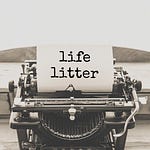best words, best order celebrates brief excerpts of exceptional writing read aloud by their authors. To learn more about best words, best order, and to nominate exceptional writing from the authors you admire on Substack, visit our information page here.
Subscribe below to receive best words, best order in your inbox.
The Nomination: Eleanor Anstruther
Dissertations could be written - maybe someday will be written - about Eleanor Anstruther's command of details. Nothing is purposeless. Nothing stands isolated. Everything is connected. Everything matters. An ashtray pushed to the edge of a coffee table is never merely an ashtray. But neither is it a token, a symbol for the clever to decode, a cipher to flatter the insider. Anstruther's details don't mean some thing. They don't tell. They show. They show you everything, holistic fractal gems that throw out worlds almost casually. That ashtray? It's a portal, the tip of a plate you feel moving beneath your feet as you read, a distribution of possibilities that each reader populates from the material in his own heart. My ashtray carries every time I tapped a burnt cigarette ash into a dish and watched the tip glow red and wondered what the hell I was going to do now. Your ashtray will be different, overlapping, maybe the same in some way. Whatever the way, we all dive in.
I picked the passage below because it illustrates this phenomenal mastery of detail with a pair of phrases that echo against one another so forcefully across two paragraphs that they can bring you to tears. I had to read the paragraphs out loud to test the "one to three minute" limit so I know this from experience. See if you don't find them yourselves.
But that's not even all of it. I also picked this passage because it demonstrates the essential power of timing - rhythm? cadence? meter? - something like that - in all great writing. The passage below, when you listen to it, beats like a deep drum. It's a song - or more accurately - a dirge. Unhappily - although it has enormous power all on its own - there is one piece of context which I have to supply because without it, the entire meaning of the piece will be upended by a wrong inference for anyone who has not read the earlier parts of the story first: the narrator is addressing his wife, Maisie, to whom he has always been faithful and devoted. Heather is their daughter. If you don't have that critical piece of information the passage seems to be saying something other than what it actually says. You just need to know: Heather is the daughter.
The Excerpt – Because I Loved You
"And five years later, I still remember waking up that morning, wedged between the freezer and the garden loungers that I’d hauled down the basement stairs only months before, the damp thinness of a mattress that’s not supposed to be slept on, the bruises on my face when I touched them, the scratches on my arm and so close to my eye you nearly gouged it, the yellow purple already beginning on my ribcage where your fist had landed. Were they easier than the five years we had coming? I don’t know. I don’t think so. I didn’t want to leave you to die in that house, but I didn’t want to die either. It was me or you, Maisie. I told Heather I was leaving before I told you. The kids said you stayed there until the plants stopped growing.
And you never told me it’s what your dad used to say. You never told me when we wrote our marriage vows that you were repeating something horrific. Because I love you. And in the city hall that was cold because we wanted to marry in a hurry and wouldn’t wait till summer, Because I love you I will give you my life. Because I love you I will give you my faith. And we used to say, jokingly, in those early days when we still lived in the apartment with the kitchen tiles the perfect red, because I love you I will drink my tea. Because I love you I will waggle my toes. Because I loved you. I don’t know where you went when the plants died in that house. The kids won’t tell me."
Subscribe and submit to best words, best order
Subscribe to receive best words, best order, a bi-weekly feature of Adam Nathan’s 100 Stories, then visit our submission page to share exceptional writing from the Substack authors you love.











